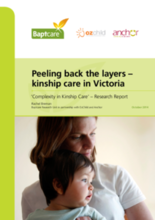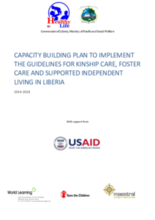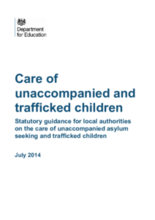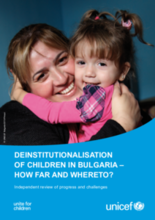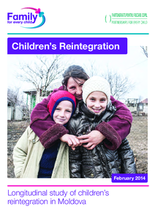Displaying 141 - 150 of 281
In the fall of 2007, Ramsey County Community Human Services (RCCHSD) was one of five sites chosen as recipients of a grant from the U.S. Department of Health and Human Services Children’s Bureau (USDHHS) for the“Using Comprehensive Family Assessments to Improve Child Welfare Outcomes” project, to develop a model of comprehensive family assessment to be used in child welfare.
Baptcare, OzChild and Anchor - three organizations that provide kinship care services in Victoria, Australia - commissioned this research to explore the impact that complexity in care arrangements has on children and families in kinship care.
This capacity building plan supports the implementation of the Liberian Guidelines for Kinship Care, Foster Care and Supported Independent Living.
This guidance sets out the steps local authorities should take to plan for the provision of support for looked after children who are unaccompanied asylum seeking children and child victims of trafficking.
This article discusses the challenges in protecting Guatemalan children and their families from involuntary separation and presents the process, results and implications of a pilot training in which Guatemalan participants from government and civil society explored the efficacy and feasibility of the FGC model in their country.
This Review, commissioned by UNICEF Bulgaria, is aimed at informing the recommendations for the Bulgarian Government’s Action Plan for the implementation of the National Strategy ‘Vision for Deinstitutionalisation of Children in Bulgaria.’
Infant Mental Health Journal has published an important Special Issue on Global Research, Practice, and Policy Issues in the Care of Infants and Young Children at Risk. This article describes a model of care for abandoned and neglected infants in need of urgent physical, social, and medical support as implemented by the Child's i Foundation, an international, nongovernmental organization operating in Uganda.
This online resource provides an overview of research, conducted by the European Union Agency for Fundamental Rights (FRA), on national child protection systems in the 28 European Union (EU) Member States.
This important report documents a 22-month longitudinal study of the reintegration of children in residential care in Moldova.
Infant Mental Health Journal has published an important Special Issue on Global Research, Practice, and Policy Issues in the Care of Infants and Young Children at Risk. This article documents an initiative to establish a replicable professional model that would direct the child welfare system in the Nizhny Novgorod Region away from institutional care and toward services for young children and their families that reduce the risk of institutionalization.

